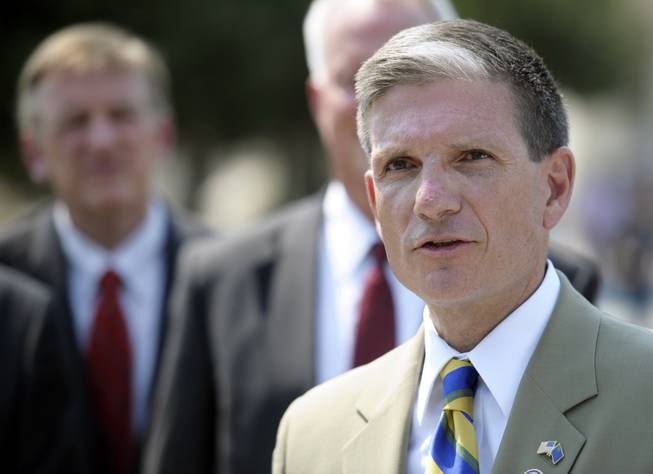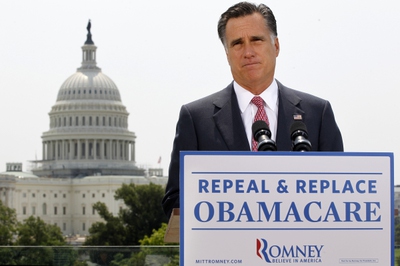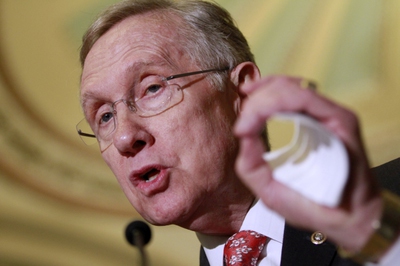
ASSOCIATED PRESS
Rep. Joe Heck, R-Nev., speaks during the GOP Doctors Caucus news conference in response to the Supreme Court health care ruling in Washington, June 28, 2012.
Friday, June 29, 2012 | 2 a.m.
Affordable Care Act could raise insurance cost
KSNV reports that the Supreme Court's decision to approve the Affordable Care Act will increase health insurance price for others, June 28.
Democrats didn’t get much time to revel in the Supreme Court’s decision to uphold the Affordable Care Act on Thursday, as Republicans swiftly turned disappointment into a redoubled campaign effort to repeal the law.
“I will act to repeal Obamacare,” Republican presidential nominee Mitt Romney repledged Thursday morning.
The problem: he almost surely can’t.
But if things swing the Republicans’ way in November, Congress could do some damage to it.
Romney has pledged to use every power at his disposal to undo the health care law if he wins the presidency: issue executive orders, hand out state waivers like candy, and work with Congress to pass a repeal.
Repeal is a tricky word for the Republicans, though. On the one hand, it makes for a catchy campaign slogan. On the other, they need enough Republicans in Congress to actually make it work.
“I don’t see (a repeal) happening,” said Mark Hutchison, the Las Vegas lawyer appointed by former Gov. Jim Gibbons to fight the health care law. “To replace (the law), we’d have to have the White House, the House and the Senate ... a supermajority in the Senate.”
Achieving that in 2012 is all but a mathematical impossibility.
It takes 60 votes to overcome the threat of a filibuster in the Senate. There is not an election forecast in existence that gives the Republicans the 13 additional seats they would need to achieve that kind of a supermajority, even if they do manage to win control of the chamber.
Without that, a formal repeal is well-nigh impossible. Nonetheless, Nevada Republicans are still promising a repeal in exchange for campaign donations and votes.
“Step No. 1 for repealing Obamacare is winning in November,” Sen. Dean Heller’s campaign blasted out to supporters Thursday in a pitch for “$13 today toward victory in November and repeal in 2013.”
“This doubles my resolve to repeal what we now know is a tax on every Nevadan who decides to exert their own control over their health care,” Nevada Rep. Joe Heck said in an interview. “The Supreme Court had their word on June 28, but the American people will have the final word on Nov. 6.”
But while Republicans can’t deliver on their promise to repeal, they might be able to offer some piecemeal destruction of the bill through an arcane process known as budget reconciliation — if they can secure a simple Senate majority.
The budget reconciliation process was used to pass the Affordable Care Act. But it could also come in handy for Republicans trying to pick it apart because the process only requires 51 votes to make changes, so long as one is reducing and not adding tax revenues to the budget.
It just so happens that on Thursday, the Supreme Court ruled the health care mandate operates as a tax, constitutional because it falls within Congress’ taxing authority.
“There’s no question that if (the mandate) is indeed a tax, you can repeal taxes using reconciliation,” said Robert Dove, who served as the Senate’s parliamentarian through 2001. It’s part of a parliamentarian’s job to act as referee during a budget committee process and determine what sorts of measures senators can and can’t strike down.
Even if budget reconciliation eliminated the mandate, the rest of the bill — coverage for pre-existing conditions, eligibility for young adults under age 26 to stay on their parents’ plan and free preventative health care — would stand.
“It’s a very narrow rule in terms of what you can put in reconciliation,” Dove explained. “Until the parliamentarian signs off on something, nobody knows anything.”
Democrats who had started the day sure that the fight over health care was over did not discount the potential of a post-election threat.
In fact, when asked whether he was concerned about Republicans’ threats to undo the law through the reconciliation process Thursday, Sen. Harry Reid answered with what sounded like a pitch to the American electorate to vote Democrat.
“All the more reason that the American people should understand we want to focus on jobs, not taking away benefits,” Reid said. “If they repeal this, it’s a loss of 400,000 jobs ... and we are here to focus on saving those 400,000 jobs and creating more jobs.”
The Democrats currently have 53 seats in the Senate, but due to retirements and close contests, need to pick up seats currently occupied by Republicans to maintain a majority.
If they do, there are few options for repeal available to Republicans, even if Romney ends up in the White House.
While Hutchison doesn’t see a possibility for repeal, he said “the fastest way to get relief” would be through executive orders waiving state participation in the law.
But even that could be problematic for Romney. The executive orders and waivers he’s been threatening to pass are either limited as temporary, not available until 2017 or require states to prove they have a functioning health care system in place that is at least as wide-reaching as the federal health care exchanges.
Over the next four months, however, politics trumps pragmatism — and there, the Supreme Court may have given Republicans a windfall by deciding against them.
“The Supreme Court’s decision does not change the facts about Obamacare: It’s a bad law that America neither wants nor can afford. And now the only way for voters to end it and pursue true reform is to vote Republican in November,” Republican National Committee Political Director Rick Wiley said Thursday. “This hurts President Obama’s re-election prospects.”
Republicans enjoyed a strong burst of voter base enthusiasm Thursday: Romney’s campaign raked in over $2 million in the six hours following the decision, and Nevada Republicans noted a marked uptick in the number of locals calling in to volunteer for the party.
But Democrats say the election game has not fundamentally changed — and that the long-term momentum from Thursday’s Supreme Court decision bends to their favor.
“Does it inject a new dynamic into the race in general? No,” said a Nevada Democratic strategist. “We are exactly where we were yesterday. This decision excites our base tremendously, but when we are in November and the results are called, ultimately people aren’t going to say, ‘This is because of health care.’ They’ll say it’s because this party was focused on middle class jobs.”



Join the Discussion:
Check this out for a full explanation of our conversion to the LiveFyre commenting system and instructions on how to sign up for an account.
Full comments policy